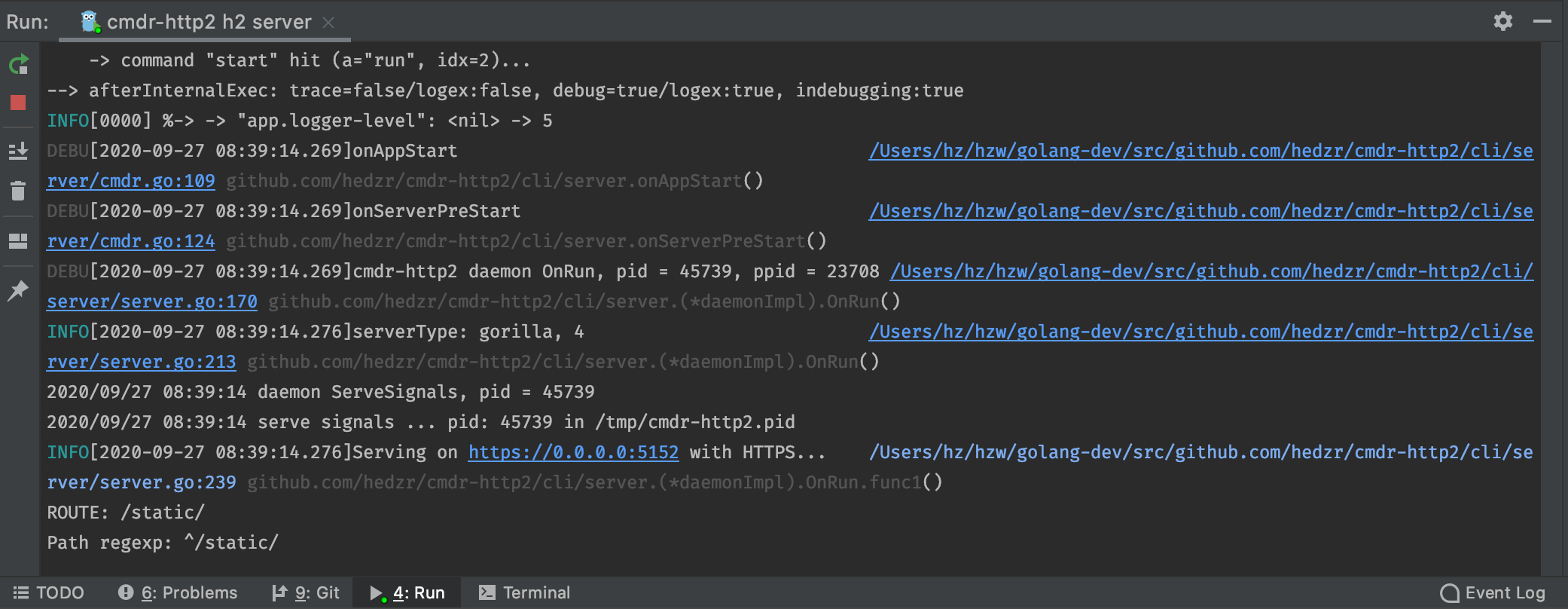logex
[TO BE ARCHIVED]








an enhancement for logrus. logex attaches the context caller info to the logging output.
Since v1.6.0, logex remove the adapters to zap and zerolog.
The only shipped adapter is logrus.
The original codes moved to ./_excluded/.
The primary reason is for reducing the target binary size. Those
adapters imports the more third-party codes and can't be optimized
due its refers are in our adapters.
So the only way to avoid importing the unnecessary libs is, remove
them from our logex framework and allow you adapt them back again
when you really want them.
Since v1.5.56, logex moved to Go Modules 1.17 and higher, the
lower versions can't be supported.
Since v1.2.0, logex allows switching the logging backends (such
as logrus, zap, ...) transparently.

Features
- Pre-setup logging backends with clickable caller info: logrus or zap
- Generic logging interface to cover the various logging backends via:
log.Logger, build.New(config)
History
-
v1.6.26
- security patch: upgrade golang.org/x/crypto to 0.17.0
-
v1.6.25
-
v1.6.23
-
v1.6.21
-
v1.6.19
-
v1.6.18
- upgraded
hedzr/log, hedzr/errors.v3
-
v1.6.17
-
v1.6.15
- unify detectors api entry to
detects pkg, user can ignore buildtags and states in readonly accessing.
-
v1.6.9
- added a func
exec.LookPath deleted at earlier version
-
v1.6.7
-
v1.6.5
- better output with error format
- upgrade deps
-
v1.6.3
-
v1.6.1
- upgrade
hedzr/log to support: pass nil to log.Fatal/Panic will safely return to caller.
-
v1.6.0
- upgrade errors.v3 to compliant with go1.20+.
- BREAK: removed adapters to zap and zerolog to reduce binary size
-
v1.5.57
- fixed
GetExecutablePath().
Old implements might return an invalid path string if a searchable executable is invoking from current directory.
Usages
Build logger transparently
We provide the ability to switch logging backends transparently now.
The supported backends currently are: logrus, zag, zerolog.
A sample config file looks like:
app:
# runmode: devel # devel, prod
logger:
# The field 'level' will be reset to "debug" while the app is started up within a debugger
# available values are:
# "disable"/"off", "panic", "fatal", "error", "warn", "info", "debug", "trace"
level: info
format: text # text, json, logfmt, ...
backend: sugar # zap, sugar(sugared-zap) or logrus, zerolog
target: file # console, file
directory: /var/log/$APPNAME
Load it to Config structure:
import "github.com/hedzr/log"
var config *log.LoggerConfig = log.NewLoggerConfig()
// ...
And build the backend:
import "github.com/hedzr/logex/build"
logger := build.New(config)
logger.Debugf("int value = %v", intVal)
Or build a logger backend directly
import "github.com/hedzr/logex/logx/logrus"
logrus.New(level string, traceMode, debugMode bool, opts ...Opt)
import "github.com/hedzr/logex/logx/zap"
zap.New(level string, traceMode, debugMode bool, opts ...Opt)
import "github.com/hedzr/logex/logx/zap/sugar"
sugar.New(level string, traceMode, debugMode bool, opts ...Opt)
import "github.com/hedzr/logex/logx/zerolog"
zerolog.New(level string, traceMode, debugMode bool, opts ...Opt)
Or, build the logger with pure go codes
import "github.com/hedzr/logex/build"
// config:=build.NewLoggerConfig()
config := build.NewLoggerConfigWith(true, "logrus", "debug")
logger := build.New(config)
logger.Debugf("int value = %v", intVal)
That's all stocked.
Integrating your backend
You can wrap a logging backend with log.Logger and register it into logex/build. Why we should do it like this? A universal logger creating interface from logex/build will simplify the application initiliazing coding, esp. in a framework.
import "github.com/hedzr/logex/build"
build.RegisterBuilder("someone", createSomeLogger)
func createSomeLogger(config *log.LoggerConfig) log.Logger {
//... wrapping your logging backend to log.Logger
}
// and use it:
build.New(build.NewLoggerConfigWith(true, "someone", "debug"))
build.New(build.NewLoggerConfigWith(false, "someone", "info"))
If you are writing logging func wrappers, you might ignore the extra caller frames for those wrappers:
func wrong(err error, fmt string, args interface{}) {
logrus.WithError(err).WithFields(logrus.Fields{
logex.SKIP: 1, // ignore wrong() frame
}).Errorf(fmt, args)
}
func wrongInner(err error, fields logrus.Fields, fmt string, args interface{}) {
logrus.WithError(err).WithFields(fields).Errorf(fmt, args)
}
func wrongwrong(err error, fmt string, args interface{}) {
wrongInner(err, logrus.Fields{
logex.SKIP: 2, // ignore wrongwrong() and wrongInner() frame
}, fmt, args...)
}
For go test
make logrus works in go test
The codes is copied from:
https://github.com/sirupsen/logrus/issues/834
And in a test function, you could code now:
func TestFoo(t *testing.T) {
defer logex.CaptureLog(t).Release()
// …
}
LICENSE
MIT

 Documentation
¶
Documentation
¶



